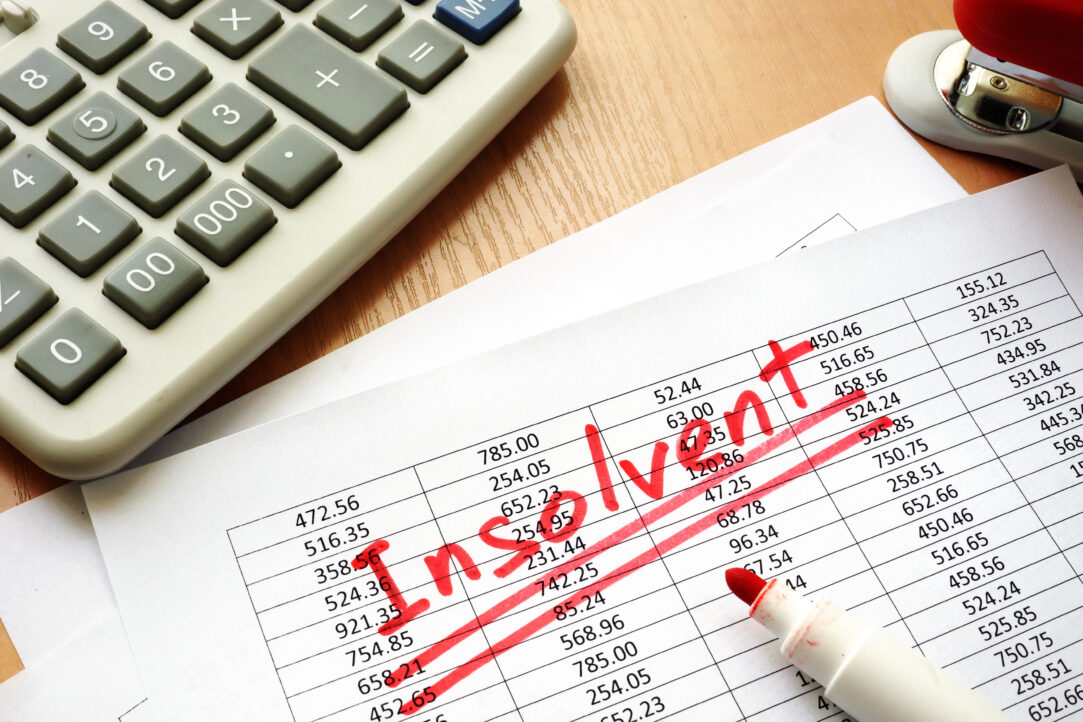- 13 Feb 2025
- •
- 7 min read
Directors' duties when a company is experiencing financial difficulties

According to The Insolvency Service’s accredited official statistics there were 23,872 registered company insolvencies in 2024.
The directors of these companies will have faced several issues and decisions, when their company was experiencing financial difficulties. Unfortunately, many of these directors may not have sought advice in relation to their duties and potential liabilities when their company enters the zone of possible insolvency, and by the time many directors seek advice it is often too late. If you are the director of a company which is facing financial difficulties, we encourage you to seek professional advice as soon as possible.
We often receive enquiries from directors when they are asked to complete the “going concern” statement in relation to the company’s accounts. This is an accountancy term and differs from the legal definition of insolvency which is set out in section 123 of the Insolvency Act 1986. A company is deemed to be insolvent (under the legal definition) if it is unable to pay its debts as and when they fall due (cashflow test), or where the value of the company’s assets is less than the amount of its liabilities (balance sheet test). This means that in some instances a company can be considered as a going concern from an accountancy perspective, but could be insolvent from a legal perspective.
There are many questions that a director facing this situation will ask, for instance whether to continue trading, whether there are sufficient funds to implement a contingency strategy, as well as considering their personal duties and liabilities. When a company is solvent the directors must act in the best interest of the company and its members. However, when a company becomes insolvent (or is on the verge of insolvency), a director’s primary duty shifts to acting in the best interests of the company’s creditors.
Directors must keep the following key considerations in mind when determining how to respond to financial difficulties:
Scope of role
One important point to note, is that the law makes no distinction between non-executive, executive or shadow directors. The director duties outlined in the Companies Act 2006, apply to anyone who has held themself out as a director or acted in a manner that they have assumed decision-making responsibilities, whether or not they are specifically named as a director at Companies House.
If an individual acts in a way that breaches their director duties, they may be held accountable for any losses incurred by the company.
Breach of Duty and Wrongful Trading
Directors (and anyone assuming that role) are expected to administer their duties in accordance with the codified duties in the Companies Act 2006. These duties include acting within powers, promoting the success of the company and exercising reasonable care, skill and diligence. The duty to promote the success of the company shifts to requiring directors to consider or act in the interests of the company’s creditors when the company is insolvent. Failure by a director to act in the interests of creditors will put them at risk of personal liability. This is linked, but separate, to directors being liable for “wrongful trading” which arises when there is no rational basis or justification for the company continuing to trade whilst insolvent (i.e. continuing beyond ‘the point of no return’).
When a company is subject to a hostile winding-up petition, this is a sign that the company has hit ‘the point of no return’. An appointed administrator or liquidator will review the directors’ actions leading up to their appointment to determine whether claims should be pursued to recover funds for the company’s unpaid creditors.
A notable example of directors’ duties being breached arose in the liquidation of British Home Stores. These concepts were explored in Court which found that the directors’ decision to continue trading increased the net deficiency to creditors and the directors were held to be jointly and severally personally liable for the losses.
Directors in this situation must be able to demonstrate that they have considered the creditors interests and acted in good faith (even if that was incorrect in hindsight).
Any director looking to protect themselves from liability should seek professional advice to support any decision to continue to trade the company whilst operating in the zone of distress, and it is essential that any professional advisers are given sufficient information about the company’s position to provide that advice. Directors can further protect themselves from personal liability by regularly reviewing their decision-making around continuing to trade, particularly against changing circumstances as well as contemporaneously recording their decision-making and the rationale for ongoing trading. It is not uncommon for directors and boards to increase the frequency of their board meetings to consider the company’s financial position to weekly or even daily if trading deteriorates. Even a sole director should keep good written records of any decision-making around trading through financial challenges.
Fraudulent trading
Under the Insolvency Act 1986, following the administration or liquidation of the company, anyone who has knowingly taken part in fraudulent activity or intended to defraud creditors can be ordered by the court to contribute to the company’s assets. A two-limb test is applied by the court which is both subjective and objective, involving a director’s knowledge and conduct.
Separately and outside of a formal insolvency, it is a criminal offence under the Companies Act 2006 to carry out fraudulent trading. As a consequence, a director may also be subject to a disqualification order under the Company Directors Disqualification Act 1986.
Transaction at an Undervalue (“TUV”)
There are certain transactions which are reviewable and potentially challengeable by an insolvency practitioner (appointed as administrator or liquidator) when a company enters a formal insolvency process. Under the Insolvency Act 1986, a TUV would apply where a company has gifted or otherwise entered into a transaction for less value than it was worth, during the relevant period prior to the company’s formal. As such, directors should be conscious whilst navigating the ‘zone of insolvency’ of their dealings and transactions with third parties. A typical example of a TUV includes disposing of assets for less than their value to raise cash for a company.
Preference
Similarly, a preference payment under the Insolvency Act 1986, would apply where a company puts another party in a better position than they would otherwise have been in anticipation of the company entering into a formal insolvency process. The company is influenced in deciding to give the preference by a desire to prefer the creditor/guarantor, at a time when the company is unable to pay its debts, or will become unable to pay its debts as a result of the transaction. When directors are making decisions on which creditors to pay during a period of financial difficulty, it is essential to consider what is required for operational purposes. An example of a preference is granting security over assets to a lender without new loan monies being provided.
Directors’ remunerations
A company can only pay dividends to shareholders out of profit. Therefore it needs to have “distributable reserves” of profit at the time that a dividend is paid, otherwise the dividend will be considered to be unlawful and the recipient of the dividend (or the director who allowed the dividend to be paid by the company) will need to repay the monies to the company. In addition, if a director has unclaimed historic expenses, there may be justifiable circumstances where these can be paid ahead of a company entering formal insolvency, but this is likely to be reviewed by a future appointed administrator or liquidator and directors should seek advice on their individual circumstances.
Personal Guarantees
If a director has given a personal guarantee in respect of a company’s liabilities, then that director may be personally liable under that guarantee when the company fails, as the company will no longer be able to honour its commitment to the creditor and the arrangement is in default. The use of company monies to settle a company debt with the objective of reducing a director’s personal guarantee exposure, will likely be caught under the preference payment or transaction at an undervalue criteria above.
Employees and National Insurance
HMRC has the power to issue Personal Liability Notices in respect of unpaid National Insurance Contributions, and directors should be alive to the possibility of being pursued by HMRC personally.
Where a company is continuing to trade, it may be essential to the running of the business to pay key employees. There are also implications for directors to consider if employees are made redundant before a company enters a formal insolvency process, as any buyer of the business and assets as a going concern will take on liabilities in respect of employees. Redundancies ahead of a transfer would be at risk of challenge and could prevent a sale of the business out of insolvency. The director’s decision-making around employee redundancies would likely be in the spotlight and reviewed by any administrator or liquidator once appointed.
Deposits
Directors should be conscious not to take deposits in anticipation of future orders, where there is uncertainty on whether the company can deliver its future obligations to that customer. Any deposits taken should be “ring fenced”, so that they can be held on trust by the company for their customers. However, advice should be sought around the company’s practice of taking deposits from customers if solvency concerns arise as the law is complex in this area.
Director Disqualification
When a company enters a formal insolvency process and an insolvency practitioner is appointed as an administrator or a liquidator, they have a duty to complete a report for the Secretary of State on each director’s conduct. We have seen a recent trend where directors who have misapplied monies from Bounce Back Loans (and other Covid loans) have been targeted for disqualification by the Secretary of State. A disqualification order can range from 2 to 15 years, and it is a criminal offence to act in contravention of a disqualification order following disqualification, and a disqualified director will be personally liable for any company debts and losses suffered by creditors.
Re-use of company name after liquidation
Another risk area for directors, arises where a company enters formal insolvency and the director continues to trade-on using the same or a similar name to that of the insolvent company. There are certain exemptions that can be applied but these are limited and appropriate legal advice should be taken ahead of the formal insolvency to mitigate the risk of liability when the company enters formal insolvency (which can be civil as well as criminal if a breach is committed).
If you are a director of a company that is suffering financial difficulties, the earlier that you seek professional advice the better. Our Restructuring and Insolvency Team are available to provide guidance at every step of the journey and help you navigate the various duties and obligations expected of you. The experts in the team frequently attend company board meetings to provide support and to assist directors personally in relation to potential risks and liabilities they may face.
For more information or if you require assistance, please contact Charlotte Boatman or Melia Hirst of the Restructuring and Insolvency team in the first instance.

Disclaimer
This information is intended for general informational purposes only and does not constitute legal advice. We recommend seeking professional advice before taking any action on the information provided. If you would like to discuss your specific circumstances, please feel free to contact us on 0800 2800 421.






